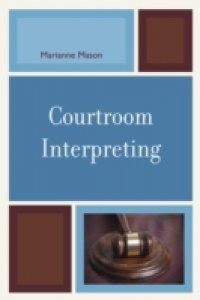In Courtroom Interpreting, Marianne Mason offers a new perspective in the study of courtroom interpreting through the exploration of cognitive and linguistic barriers that court interpreters face everyday and ultimately result in an interpreter's deviation from original linguistic content. The quality of an interpreter's rendition plays a key role in how well a non-English speaking defendant's legal rights are served. Interpreters are expected to provide a faithful rendition of all semantic, syntactic, and pragmatic content regardless of how difficult the task may be at a cognitive level. From a legal perspective this expectation may be sound as it disregards the cost associated with the interpreter having to account for a great deal of linguistic content. Mason proposes that if the quality of interpreters' renditions is to improve and the rights of non-English speaking minorities is to be better served the issue of cognitive overload needs to be addressed more effectively by the court interpreting community.

